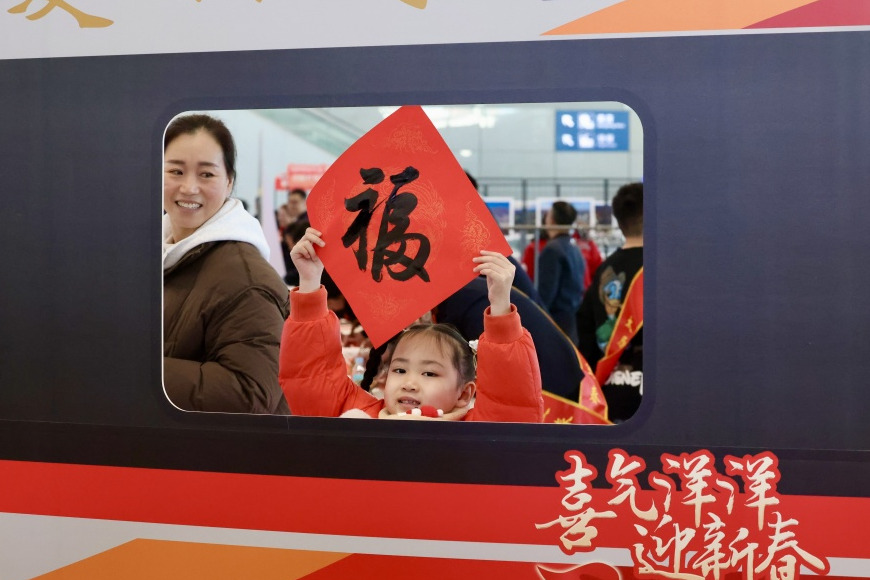Lessons in the art of teaching

She may already be 90, but Yu Yi is still very much involved in the educational reform process in Shanghai.
The recipient of the People's Educator award from President Xi Jinping this year, Yu has spent more than six decades teaching Chinese classes. Today, she sits on a Chinese education advisory board in Shanghai and is a part-time professor at not one, but four institutions-East China Normal University, Capital Normal University, Shanghai Normal University and Shanghai University.
"It is my calling to be a teacher and to learn to be a teacher," said Yu, stressing the importance of lifelong learning.
"A deep understanding of one's mother tongue is essential any time, and especially so in today's climate when social change is constant," she said.
To Yu, teaching Chinese is more than just providing students with a tool to communicate-it is more about the culture behind the language, which in turn inculcates a sense of belonging and national pride. A passionate educator who always went the extra mile to make her lessons engaging, Yu was a highly popular teacher who students adored.
At Yangpu High School where she taught, it was a tradition for graduating students to attend her class one last time before they left school.
Early years
But as prolific a Chinese teacher as she was, Yu was not always an expert. After graduating from the Department of Education at Fudan University in Shanghai in 1951, her first posting was as a history teacher at Shanghai No 2 Normal High School. It was only in 1959 that she started teaching Chinese.
"I was so nervous at that time," Yu said. "To prepare for class, I would walk for 15 minutes every morning and think about how I would conduct the class, reciting the things I planned to say. Teaching was like an art to me."
After earning the honor of being among the first batch of special grade teachers in 1978, Yu's classes were open to educators across the nation. Yu went on to teach more than 2,000 courses to her peers, with more than 50 of them recognized as milestones in the reform of Chinese language education.
By the end of 2017, Yu had published 531 articles, 37 monographs and 100 books in collaboration with other education experts.
Recognition
From 1992 to 1994, Yu and teachers from Michigan State University in the United States and Oxford University in the United Kingdom jointly carried out a series of research projects. Their achievements eventually won the second prize at the Shanghai Educational Science Research Achievements Awards and were later shared with educators from other foreign countries.
But instead of using the award money to pamper herself, Yu bought books for her students so they could set up a library in the classroom. She also used the cash to help her students publish newspapers and buy tickets to museums so that they could broaden their horizons.
"Teacher Yu made us understand that learning Chinese is not just about textbook knowledge," said Wang Wei, one of Yu's former students who became a special grade teacher in Shanghai and a Chinese teacher at Yangpu High School.
"She paid attention to the comprehensive development of students, including their listening, speaking, reading and writing abilities. She not only inspired them to be interested in Chinese but also cultivated their ability to question. Everyone could feel her sincerity."
When Yu assumed the role of principal at Shanghai No 2 Normal High School, she allowed students to design and choose their own uniforms, introduced an initiative where they had to clean the school themselves and established a Japanese course which gave students the opportunity to study in Japan.
"Teacher Yu's idea of opening the Japanese course and strengthening international education was a very significant undertaking. Not only did our students go to Japan, but Japanese students also came to Shanghai and that promoted exchange between the two countries," said Bu Jian, who was Yu's student at Shanghai No 2 Normal High School.
Bu, who is an official of Shanghai Yangpu District, added that while Yu's educational concepts were ahead of their time and sometimes difficult to comprehend, she ultimately showed her peers that it is important to always be innovative, forward-looking and tenacious.
"Education has always been a national and ethnic undertaking. The education of any country, especially in basic education, must inherit the cultural tradition of the nation, carry forward the national spirit, and cultivate the talents for the country," Yu said.


Today's Top News
- Stellar Olympic performances spark craze for emerging sports
- US must respect China's core interests on Taiwan
- Adjustments to monetary policies eyed
- Xi extends congratulations to new president of Lebanon
- New quality productive forces revitalize 'old' sectors
- China, EU urged to build on past achievements






























